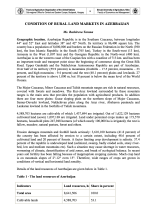/ library resources
Showing items 10 through 18 of 73429.The Beijing Platform for Action, an agenda for women's empowerment, spelled out a set of objectives and actions to be taken by governments, the international community, non-governmental organisations and th
This page is meant to provide a quick overview of major reference to women's land rights in existing international instruments, as well as paragraphs related to women - or more broadly gender - in the First Draft of
The paper elucidates the current structure of university education in Belarus and particularly emphasises available levels of education.
Armenia is geographically located in the South Caucasus and bordered by Georgia, Turkey, Azerbaijan and the Islamic Republic of Iran.
Azerbaijan Republic is in the Southern Caucasus, between longitudes 444 and 522 East and latitudes 388 and 422 North. Its territory is 86,400 square km.
A two-pronged agricultural land reform was devised in Georgia to move toward a market- oriented economy, one prong being the distribution of land parcels of up to 1.25 hectares in ownership to rural families (the “small parcel” approach), and the second being the leasing of the remaining state-ow
The land fragmentation in Bulgaria is a big problem after the land restitution.
The paper provides basic sharacteristics of Real Estate Cadastre as a unique record system of real estate and registration rights with overview regarding its implementation and ways of managing Land Cadastre and Land Books.
Paginación
Land Library Search
Through our robust search engine, you can search for any item of the over 64,800 highly curated resources in the Land Library.
If you would like to find an overview of what is possible, feel free to peruse the Search Guide.



